Katia & Marielle Labèque (original) (raw)
TRILOGY COCTEAU/GLASS
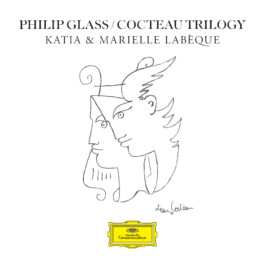
La Belle et la Bête: Le Pavillon
Music by Philip Glass
Two pianos version by Michael Riesman
Pianos: Katia and Marielle Labèque
Video directed, animated and edited by Pauline de Lassus
Orphée: Orphée et la princesse
Music by Philip Glass
Two pianos version by Michael Riesman
Pianos: Katia and Marielle Labèque
Video directed, animated and edited by Pauline de Lassus
“On ferme les yeux des morts avec douceur; c'est aussi avec douceur qu'il faut ouvrir les yeux des vivants.”
—Cocteau
In 1964, at the age of 27, Philip Glass moved to Paris to study under Nadia Boulanger. Their meeting would prove decisive in the young composer’s training and afforded him an immersion into French culture that left a lasting impression on the artist. His love of France also gave him a command of the French language that would help him to write and versify the operas that he dedicated to Cocteau during the 1990s.
In 2021, Katia and Marielle Labèque created the instrumental suites for two pianos taken from Philip Glass’s opera Les Enfants Terribles, based on the film by Cocteau. The success of both the record and their concerts – held at venues including the Philharmonie de Paris – left the pianists all the more eager to ask Philip Glass and his music director Michael Riesman to complete the trilogy by applying the same method to the remaining two operas in the Cocteau Trilogy: Orphée and La Belle et la Bête.
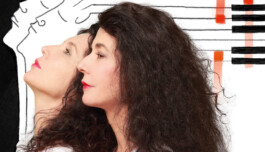
Katia and Marielle Labèque perform the suites for two pianos from the three operas making up Philip Glass’s Cocteau Trilogy in a staging designed by Nina Chalot and Cyril Teste, and a new fragrance by Francis Kurkdjian.
Philip Glass Orphée, La Belle et La Bête, Les Enfants Terribles (suite for two pianos)
Katia Labèque Piano
Marielle Labèque piano
Cyril Teste Artistic Director
Nina Chalot Stage Design
Francis Kurkdjian, création de parfums
Mehdi Toutain-Lopez Digital Design
Production Philharmonie de Paris
Co-production Barbican Center, National Concert Hall - Dublin, Cité musicale - Metz, Opéra National de Bordeaux, La Comète Scène Nationale de Châlons-en-Champagne, Les Nuits de Fourvière
Avec le généreux soutien d’Aline Foriel-Destezet, Grande Mécène Fondatrice de Musique en Scène
Avec le soutien de Maison Francis Kurkdjian
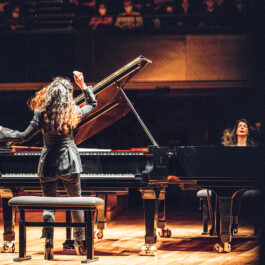
NEXT CONCERTS
Philharmonie de Paris
Salle des concerts - Cité de la musique
Official Program here
Thursday 7 March 2024 – 8pm
Friday 8 March 2024 – 8pm
Saturday 9 March 2024 – 8pm
Sunday 10 March 2024 – 4pm
Bordeaux 23.03
Metz 27.03
Festival ClassicAnd - Andorre 01.06
Dublin 15.06
London 17.06
Lyon 28.06
Ravel Festival - St Jean de Luz 24.08
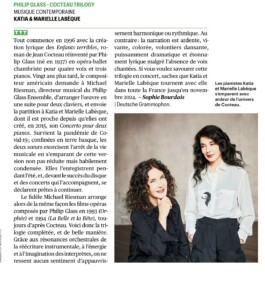
Katia et Marielle Labèque concluent en beauté leur triptyque dédié à Cocteau
Les sœurs pianistes consacrent leur nouvel album à trois œuvres de Cocteau mises en musique par Philip Glass : “Orphée”, “La Belle et la Bête” ainsi que “Les Enfants terribles”.
TELERAMA
Par Sophie Bourdais
Publié le 11 mai 2024 à 14h02
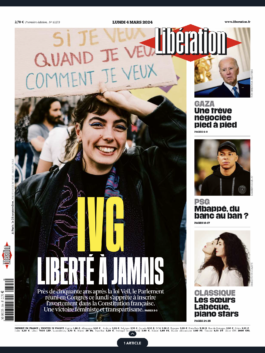
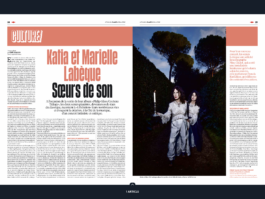
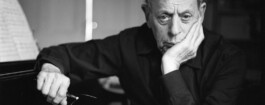
Philip Glass
When I began work on the Cocteau trilogy, the first idea that governed my work was to bring out the underlying themes of the three films. They are best described as a pair of dualities – life/death and creativity being the first; and the ordinary world and the world of transformation and magic being the second. These topics are at the core of all three works and are explicitly put forward in the films. Whereas the first trilogy of operas (Einstein on the Beach / Satyagraha / Akhnaten) was about the transformation of society through the power of ideas and not through the force of arms, this second trilogy from the 1990s revolves around the transformation of the individual – the moral and personal dilemmas of a person as opposed to a whole people or society.
A corollary to this is the way in which magic and the arts are used to transform the ordinary world into a world of transcendence. These three films of Cocteau are meant as a discussion, description, and instruction on creativity and the creative process.
—Philip Glass (in Words without music)
It was a most natural step for piano’s two enfants terribles, performers with a history of taking inspiration from the catalogue of the repetitive American composer. While Four Movements for Two Pianos swiftly became a staple of their recitals, in 2015 the Labèque sisters added another arrangement by Philip Glass to the impressive list of two-piano concertos composed for them (Los Angeles Philharmonic, conducted by Gustavo Dudamel).
To heighten the audience’s listening experience of each opera, stage director Cyril Teste and stage designer Nina Chalot have placed a chandelier above the pianists to produce an atmosphere of intimacy. The object offers endless different possibilities in terms of staging (set, lighting, video, text and more) and dramatics to enlighten listeners during the successive performances of the three suites.
THIS SISTER PIANO DUO ARE TELEPATHIC: TRILOGY COCTEAU/GLASS
“unerring sensitivity , virtuosic ferocity, telepathic co-ordination …..I can’t imagine this music being better served….”
— THE TIMES, Daniel Lewis
GLASS’S COCTEAU TRILOGY PERFUMES THE AIR, LITERALLY
“…elegant, wistful melodic lines that float over his rippling piano textures ….played with all the Labèques’ usual flair and precision”
—THE GUARDIAN, Andrew Clements
“Voici donc la trilogie complétée, et de belle manière. Grâce aux résonances orchestrales de la réécriture instrumentale, à l’énergie et à l’imagination des interprètes, la narration est ardente, vivante, colorée, volontiers dansante, puissamment dramatique et étonnamment lyrique”
—TELERAMA
“Les opéras de Glass, gagnent à cette réduction pour deux pianos sous les doigts des sœurs Labèque, restituant les rythmes et couleurs de ces partitions avec la vigueur, la brillance et la sobriété qui conviennent.”
—LIBERATION, Eric Dahan
“Orphée, La Belle et la Bête et Les Enfants terribles Trilogie Cocteau. Un ensemble extraordinaire De la très grande musique.”
—LE FIGARO, François Delétraz
“ Exceptionnel de beauté, de densité, de maîtrise, de poésie”
—X, Renaud Machart
“Katia et Marielle Labèque sont comme deux poissons dans l’eau dans cette musique envoûtante et énergique à leur image.”
—RESMUSICA, Jean-Marc Petit
“... Force rythmique...énergie vitale …..Servi par ce « quatre mains » époustouflant , Philip Glass se révèle plus envoûtant que jamais. L’ivresse musicale, c’est cela.”
—LES ECHOS, Stéphanie Renard
“La musique de Philip Glass continue d’attirer les spectateurs, comme le montre les concerts pris d’assaut de Katia et Marielle Labèque à la Philharmonie de Paris , consacrés à la trilogie Cocteau/Glass.”
—LE MONDE, Bruno Lesprit
“une des merveilles peu connues du répertoire. Des œuvres extraordinaires”
—LE FIGARO MAGAZINE, François Delétraz
“...la Trilogie Cocteau de Glass est, sous les doigts des sœurs Labèque, une œuvre d’une efficacité redoutable, multipliant toujours les atmosphères dans un écrin captivant. Tantôt virevoltant et joyeux, tantôt mélancolique. Révélant toujours de nouvelles couleurs, dans une interprétation fusionnelle.”
—LE SOIR, Gaëlle Moury
KATIA ET MARIELLE LABÈQUE : « CETTE TRILOGIE EST UN DIALOGUE INTENSE ENTRE LUMIÈRE ET OMBRE »
— LE PETITE BULLETTIN
Rencontre / Après avoir ébloui les publics de Paris, Dublin et Londres, Katia et Marielle Labèque se préparent à retrouver le théâtre de Fourvière pour présenter leur dernier chef-d’œuvre, la Trilogie Cocteau, triptyque opératique de Philip Glass inspiré des films du génie français...
— Fabrizio Migliorati
The Cocteau Trilogy — Philip Glass
A conversation with Katia and Marielle Labèque
Le compositeur, âgé de 87 ans, a imprimé sa marque sur tous les genres, de la pop au hip-hop, du néoclassicisme à l’électro.
Glass: Cocteau Trilogy
—LIMELIGHT
Glass and Cocteau find thrillingly eloquent champions in the Labèque sisters.
—Michael Quinn
March 28, 2024
A Lille, les soeurs Labèque, de conte en conte
—RESMUSICA
Toujours flamboyantes, Katia et Marielle Labèque ont séduit le public lillois avec un beau programme où contes et monde de l'enfance, mis en musique par Maurice Ravel ou Philip Glass, étaient mis en miroir.
—Jean-Marc Petit
May 17, 2024
Les Labèque en ambassadrices de la Trilogie Cocteau de Philip Glass
—RESMUSICA
Il était logique que Deutsche Grammophon permette à Katia et Marielle Labèque de parachever leur immersion pianistique dans la Trilogie Cocteau de Philip Glass.
—Jean-Luc Clairet
May 17, 2024
Nuits de Fourvière : Cocteau à l’âge de Glass
—LYON CAPITALE
À Fourvière, les fantastiques sœurs Labèque s’emparent de trois opéras composés par Philip Glass et consacrés aux films de Jean Cocteau. Ces Suites, arrangées pour deux pianos, bénéficieront d’une scénographie originale faisant appel aux arts numériques.
—Guillaume Médioni
Juin 26, 2024
Cyril Teste : direction artistique
Nina Chalot : scénographie
The chandelier transports the audience to an intimate space or drawing room reminiscent of the castle in La Belle et la Bête or the closed door of Les Enfants Terribles.
Preferably central staging will be used, with frontal staging also a possibility.
The chandelier is traditional in style and is revealed as the light appears within it. It hangs a few metres above the pianos and interacts with the music by means of some ten preset light programmes that are subtle enough so as not to eclipse the listening experience. Light is produced dot by dot on each segment to form different shapes and types of movement on the inside and outside of the chandelier. This set-up can also be used to project video images in colour and display text to help structure the performance.
The object can be disassembled and transported and is easy to repair. Technical development of the controls and connections is currently underway.
—Nina Chalot & Cyril Teste
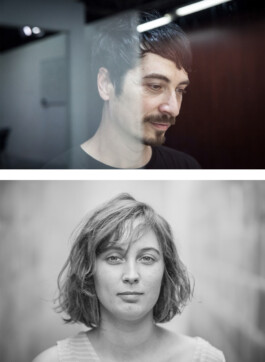
Philip Glass &
Les Enfants Terribles
Philip Glass’s music occupies a special place in Katia & Marielle Labèque’s creation. At Philip Glass’s request, Michael Riesman, his longtime collaborator and arranger, did the arrangement of the opera ‘Les Enfants Terribles’ for Katia and Marielle in a suite for two pianos in April 2020. The album in which the work of Jean Cocteau and Philip Glass confront each other was put into images by Ronan Day-Lewis.
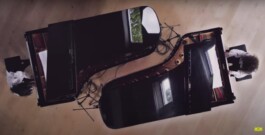
“The standout item, though, was the UK premiere of a new arrangement for two pianos of Glass’s “dance opera” Les Enfants Terribles. ….remarkable playing: their velveteen touch interrupted periodically by harsh attacks, their exchange of patterns, sounds and colours almost liquid.”
—THE GUARDIAN
“The recording by the Labèques of this for DG is a miracle of performance; but somehow this account trumped it. Perhaps it was the occasion of its UK première, but the sisters, surely the perfect piano pairing, somehow took the excitement of the piece to greater heights….huge power, crystalline playing, every detail audible and clear….this was an utterly remarkable performance.”
—SEEN and HEARD INTERNATIONAL
“The “Enfants Terribles Suite” proved, to my surprise, the evening’s masterpiece. Glass’s complete “Enfants Terribles” – the second of three Glass works based on Jean Cocteau creations –(1996). Having never seen it, I now long to – and yet could it equal the intimate beauty of Michael Riesman’s two-piano suite? The Labèques played it with devout objectivity. While each section illustrates the moods and actions of scenes in the narrative, the work overall becomes a subtly and enchantingly poetic series of études. Here and there are echoes of many older composers (Beethoven, Chopin, Debussy) – This music is an open-sesame of affecting rhythmic structures and intensely atmospheric pianistic colours. I want to call it the finest of the many Glass compositions I’ve heard; I congratulate Riesman on the glorious sensitivity to pianistic sound he conjures here.”
—SLIPPEDISC
“Le jeu puissant des soeurs Labeque transcrit avec vehemence la passion poussée jusqu’aux limites de la folie et emporte dans un voyage dont on ne sort pas indemne...”
—CLASSICA *****
Katia & Marielle Labèque – Philip Glass: Les enfants terribles: Paul is dying (Part 1)
Video directed by Ronan Day-Lewis
Katia & Marielle Labèque – Philip Glass: Les enfants terribles: The Somnambulist (Part 2)
Video directed by Ronan Day-Lewis
Katia & Marielle Labèque – Philip Glass: Les enfants terribles: Lost (Part 3)
Video directed by Ronan Day-Lewis
Note from the director:
Ronan Day-Lewis
“Before shooting, I read the Cocteau novel Les Enfants Terribles, which inspired Philip Glass’s music for these pieces, and found it a transcendent experience. I connected deeply with the subject matter of these two lost souls isolated in a world of their creation. As well as the current relevance of the story to our collective isolation in the midst of a global pandemic, I was drawn to its themes of the difficulty of leaving childhood behind, and the dangers of clinging to a paradise already lost, or one that was never really there. The book seemed to hint at something sublime. I started to feel that it contained all the ethereality and bodily reality of the human condition, the desperate fragility of life condensed into 193 pages. Cocteau’s poetic vision, combined with Philip Glass’s music interpreted entrancingly by Katia and Marielle Labèque, cast a spell over me which made it easy to disappear into the world of the holy terrors.”